#Nikolay Figner
Text
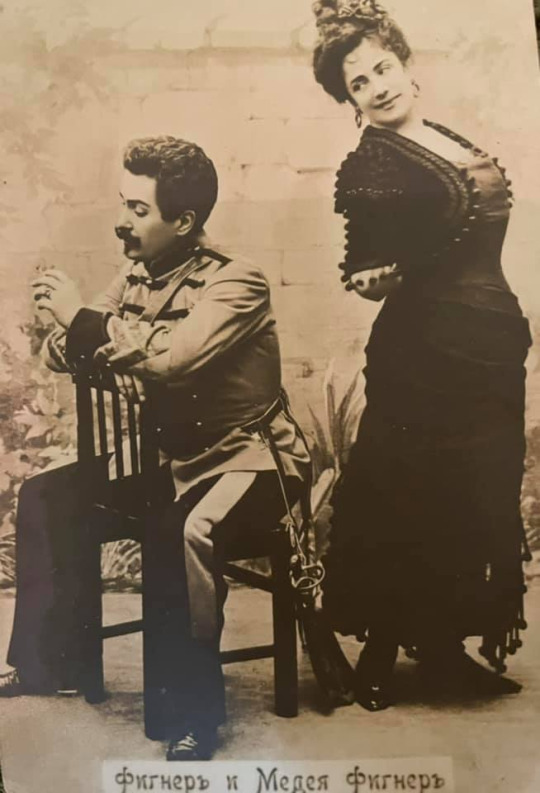
On this Postcard we see Medea Figner (1859-1952) with her husband, the well-known tenor Nikolay Figner in the opera Carmen. Medea Figner sung in the world premieres of the Tchaikovsky operas "Pique Dame" Lisa and the title role in "Jolanthe". She was considered the best actress of Tatiana in "Eugene Onegin", together with her husband on stage.
At the age of 16 she sang the mezzo part in Verdi's "Requiem".
#classical music#opera#music history#bel canto#composer#classical composer#aria#classical studies#maestro#chest voice#Medea Figner#mezzo-soprano#soprano#Nikolay Figner#tenor#lyric tenor#Medea Mei-Figner#classical musician#classical musicians#classical voice#classical art#classical history#history of music#historian of music#musician#musicians#diva#prima donna#Royal Opera House#Covent Garden
1 note
·
View note
Text
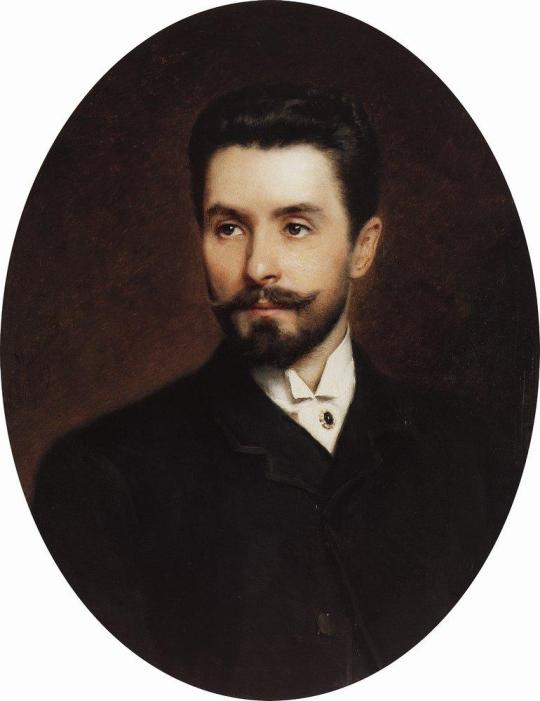
Konstantin Makovsky (Russian 1839 – 1915) Portrait of Russian Opera Singer Nikolay Figner, 1889
62 notes
·
View notes
Text
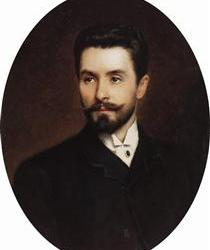
Konstantin Makovsky, 'Portrait of Russian opera singer Nikolay Figner' (1889)
18 notes
·
View notes
Video
youtube
Nikolay Figner (Николай Фигнер) sings “Oh, give me oblivion” (”О дай мне забвение, родная”)
As you have probably guessed, I’ve spent the past week listening to various versions of this aria - there aren’t a lot of other bits of ‘Dubrovsky’ available on youtube - the whole or this.
I first heard about Nilolay Figner (the role of Gherman in ‘Pilovaya Dama’ was written for him) long before my absession with opera started - at uni we studied the Narodovolcy organization (they contributed to the abolition of slavery in Russia and eventually murdered tzar Alexander II) in minute detail as one of our prossessors was a fanboy/expert on the topic and I got fascinated by one of the highranking members of this group - Vera Figner (this woman still, to this day holds the record of the longest run from the Russian political police - 5 years on the run!) Since that time, I’ve been fascinated by the dillemma: was it more bizarre for a famous operatic tenor to have a major political terrorist for a sister or the other way round?
#opera#my opera shananigans#Dubrovsky#Nikolay Figner#and actually their other sister also was a revolutionary
0 notes
Text
Queen Of Spades Opera

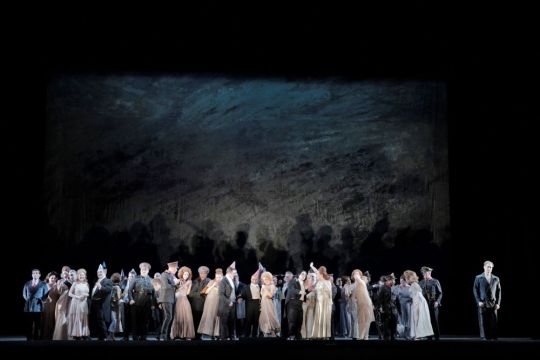

1890 The Queen of Spades (Tchaikovsky). In a letter to his brother and librettist the composer said that 'the opera is a masterpiece'. 1891 L'amico Fritz (Mascagni). This work has been thought of as a late example of opera semiseria. 1892 Iolanta (Tchaikovsky). Tchaikovsky's last lyrical opera set to a libretto by his brother Modest. In December 1889, Tchaikovsky finally turned to Queen of Spades—his tenth and penultimate opera, his third based on Pushkin, and the first composed for singers of his choosing: Nikolai and Medea Figner. The problem was finding relief from distractions so he could work.
The Queen of Spades, Op. 68 (Russian: Pikovaya dama, French: Pique Dame) is an opera in 3 acts (7 scenes) by Pyotr Ilyich Tchaikovsky to a Russian libretto by the composer's brother Modest Tchaikovsky, based on a short story of the same name by Alexander Pushkin. The premiere took place in 1890 in St. Petersburg, Russia.

Queen Of Spades Opera Glyndebourne

Queen Of Spades Opera Review
The management of the Imperial Theatre offered a commission to Tchaikovsky to write an opera based on the plot sketch by Ivan Vsevolozhsky in 1887/88. After turning it down initially, Tchaikovsky accepted it in 1889. Toward the end of that year, he met with the theater's managers to discuss the material and sketch out some of the scenes.
He completed the full score of the opera in Florence in only 44 days. Later on, working with the tenor who was to perform the lead character's part, he created two versions of Herman’s aria in the seventh scene, using two different keys. The changes can be found in the proof sheets and inserts for the first and second editions of the printed version of the score.
While composing the music, Tchaikovsky actively edited the libretto, changing some of the text and adding his own lyrics to two arias.

1 note
·
View note
Text
Some interesting facts on the development of War and Peace from my reading of R.F. Christian’s Tolstoy’s War and Peace: A Study
#2: Prototypes
Natasha is actually based off of Tolstoy’s sister-in-law, Tatyana “Tanya” Behrs Kuzminskaya
Interesting (but not from this book): Tanya was actually known for her beautiful, deep contralto singing voice. It’s possible Tolstoy envisioned Natasha’s voice the same
The incident with Anatole is based off of Tanya’s real experience with Anatoly Shostak, who served as a prototype for Anatole Kuragin
The male Rostovs are based off his family, Nikolai being his father, Nikolai Ilyich Tolstoy, and Ilya being his grandfather Ilya Andreevich.
They were once going to be called the “Prostoys.” Prostoy means “simple,” making Ilya “Count Simple.” Tolstoy considered the real Ilya a man of limited intelligence.
Sonya is likely based on his wife Sofya, and Vera on his other sister-in-law, Elizaveta Behrs. Vera was originally called “Lise.”
Marya Dmitrievna Akhrosimova was based on a real woman named Nastasya Dmitrievna Ofrosimova. She was a proud, old fashioned Russian well known for not mincing words and appeared as an inspiration in other works by Tolstoy’s contemporaries.
Dolokhov was a combination of A.S. Figner and Tolstoy’s relative, Fyodor Ivanovich Tolstoy.
Tolstoy stated that unlike other characters, Prince Andrei was not based on anyone, but rather invented to fill a position in the story.
146 notes
·
View notes
Photo
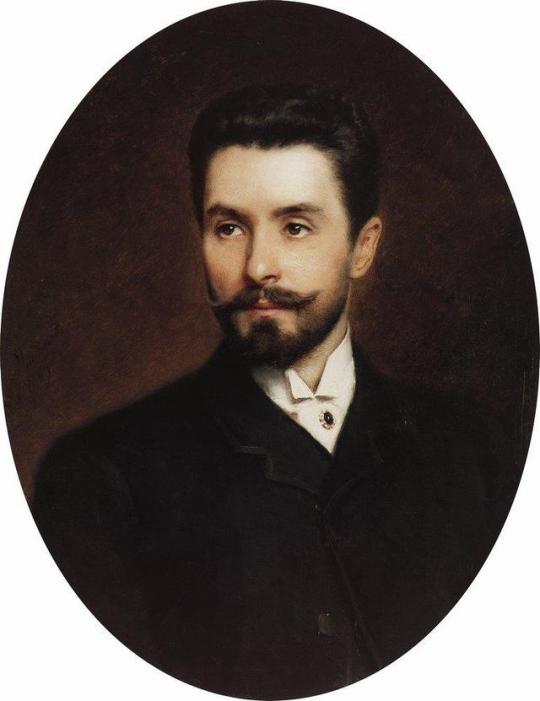
Portrait of Russian opera singer Nikolay Figner, 1889, Konstantin Makovsky
25 notes
·
View notes
Photo
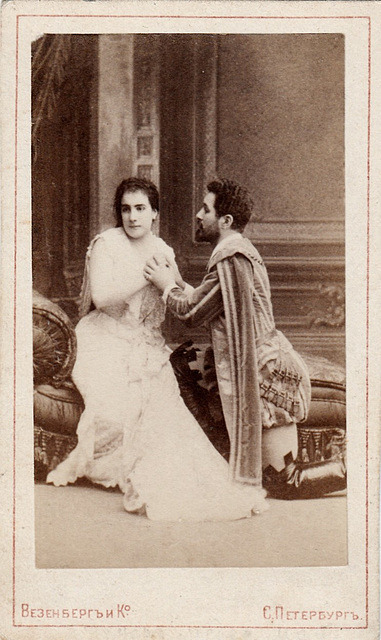
Nikolai Figner (1857-1918); Russian tenor.
He studied singing in St. Petersburg with Ippolit Pryanishnikov and Camillo Everardi and in Naples with De Roxas. Here in Naples in 1882 he made his debut at the Teatro Sannazaro in Gounod's opera "Philémon et Baucis". In the following years he sang at the opera houses of Parma and Bologna and made international guest appearances at London, Madrid, Bukarest and St. Petersburg.. At the opera of Parma he performed in Aida and La Gioconda together with his future wife Medea Mei (they got married in 1889). In 1887-1904 and in 1907 he was engaged at the Mariinsky Theatre in St. Petersburg. In 1887 he sang the title role in the Russian premiere of Verdi 's "Otello" and since 1889 he celebrated here many triumphs together with his wife. The singer couple had a large influence on Russian musical life of their epoch. The with them befriended composer Tchaikovsky completed on their country estate in the vicinity of Tula his opera "Pique Dame", which he dedicated to the two artists. In the premiere in St. Petersburg (1890) Nikolai Figner sang the the role of Hermann and Medea Mei-Figner the role of Liza. In 1892 they performed in another Tchaikovsky première; Mei-Figner created the title role of Iolanta and Figner the role of Count Vaudémont. In 1903 the singer couple divorced. In the years 1907/10 he sang at various private opera companies in Russia. During the period 1910/15 he was director of the Narodny Dom Theatre at St. Petersburg. In the turmoil of the Russian revolution of 1917 the once idolized artist completely impoverished.
Medea Mei-Figner, born Amedea Mei Zovaide (1859-1952); Italian soprano/contralto.
She was born in Florence and studied with Bianchi, Carozzi-Zucchi and Panofka. In 1874 she made her debut at Sinaluga as Azucena in Verdi's "Il Trovatore". During the following nine years she appeared in various Italian theatres. She made guest appearances in Madrid, Barcelona, London, Bukarest, Russia and South America. At that time her repertory included Amneris, Ulrica, Leonora (in La Favorita) and Carmen. Step by step she began to shift into the soprano repertory. She sang Valentine in Les Huguenots, Charlotte in Werther and Margherita in Mefistofele. During her appearances in Milan she met her future husband, the Russian tenor Nicolai Figner (1857-1918). She married him in 1889. They both joined the Imperial Opera in St. Petersburg, where they had very succesfull careers. The singer couple had a large influence on Russian musical life of their epoch. The with them befriended composer Tchaikovsky completed on their country estate in the vicinity of Tula his opera "Pique Dame/Queen of Spades", which he dedicated to the two artists. In the premiere in St. Petersburg (1890) Nikolai Figner sang the the role of Hermann and Medea Mei-Figner the role of Liza. They also created leading roles in the première of Tchaikovsky’s "Iolanta" (1892); Nicolai as Count Vaudémont and Medea as Iolanta. They sang at the première of 2 operas by the Czech composer and Mariinsky conductor Edouard Nápravnik: "Dubrovsky" in 1895 and "Francesca da Rimini" in 1902. She spent her life in Russia but remained an Italian trained singer. She appeared mostly in Italian and French operas. The couple was much loved by the Tsar’s family and they were guests at all the elegant drawing-rooms of Imperial Russia. In 1903 the singer couple divorced. In 1904 she made a last operatic tour in South America and continued her career at the Mariinsky Theatre in St. Petersburg until her farewell performance as Carmen in 1912. She finally left Russia in 1930 and settled in Paris where she died in 1952.
2 notes
·
View notes
Photo

Medea Mei (1859–1952), mezzo-soprano, later soprano was born in Florence, Italy, on 4 March 1859. She studied there with Bianchi, Carozzi-Zucchi and Panofka. She sang the mezzo-soprano role in Verdi's Requiem at the young age of 16, and made her operatic debut soon afterwards, as Azucena in Il trovatore, at Sinalunga. She became well known throughout Italy, and also toured Spain, South America and Russia and visited London. Her repertoire then included Ulrica in Un ballo in maschera, Amneris in Aida, Gertrude in Ambroise Thomas's Hamlet, Leonora in Donizetti's La favorite, and the title role in Bizet's Carmen. She latter added soprano roles such as Charlotte in Massenet's Werther, and Margherita in Boito's Mefistofele. Medea went to Russia with Nikolay Figner in 1887, making her debut there on 8 May at the St Petersburg Imperial Opera (the Mariinsky Theatre) as Valentine in Meyerbeer's Les Huguenots. The soprano knew no Russian at that time, and sang in Italian during the first two St Petersburg seasons. Subsequently, she was received into the Russian Orthodox Church, and married Figner on 20 February 1889. Thereafter, Nikolay made it his practice to sing only in operas in which Medea was also singing. She was referred to after marriage as either Medea Mei-Figner (the form of her name used in most Western reference books) or simply Medea Figner. Furthermore, she was given the patronymic of Ivanovna, and is sometimes designated as Medea (or Medeya) Ivanovna (Mei-)Figner. She eventually mastered Russian to such an extent that native speakers could not tell she had learned it only from the age of 30.Notably, Medea appeared as Mimi in the first performance of Giacomo Puccini's La bohème in Russia; she was coached by Puccini himself. Medea Mei-Figner is the great-great-grandmother of the Italian soprano Amarilli Nizza.
4 notes
·
View notes
Photo
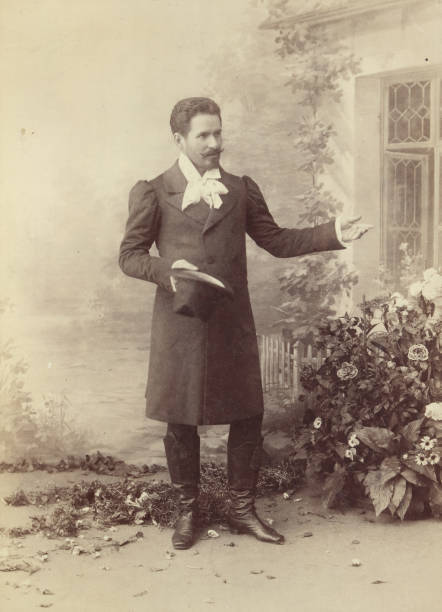
Nikolay Nikolayevich Figner (1857–1918), lyric tenor, was born in Nikiforovka, near Kazan, on 9/21 February 1857. He was a brother of the famous "People's Will" revolutionary, Vera Figner (1852–1942). He joined the Russian Navy as a midshipman, and rose to the rank of lieutenant, retiring in 1881 to study voice with Vassily Samus, I. P. Pryanishnikova and Camille Everardi at the Saint Petersburg Conservatory. Figner then travelled to Italy, where he made his debut at Naples in Gounod's Philémon et Baucis in 1882.[3] He sang at the San Carlo Theatre and appeared at other Italian venues for a number of years. While in Italy, Figner took the opportunity to study with the prominent singing teacher Francesco Lamperti and also received instruction from E. de Roxas. Figner performed, too, in Madrid, Bucharest and London (at the Royal Opera House, Covent Garden) He travelled to South America as well during this period. On 4 November 1886, in Turin, he sang the principal tenor role in the world premiere of the revised version of Alfredo Catalani's Edmea;[4] this was also the occasion of Arturo Toscanini's first appearance as a conductor in Italy after his initial triumph in South America.[3][5][6] During his travels, he sang roles such as Arnold in Rossini's William Tell, the Duke in Verdi's Rigoletto, and Carlo in Donizetti's Linda di Chamounix. He also happened to appear on stage with Medea Mei in a production of Donizetti's La favorite; they formed a liaison, and he brought her back to Russia in 1887. Two years later, they wed. Figner soon established himself as the leading tenor at the Mariinsky Theatre, retaining this status until 1903. Other Russian composers whose operas he sang were Alexander Borodin (Vladimir in Prince Igor), Alexander Dargomyzhsky (the Prince in Rusalka), and Anton Rubinstein (Sinodal in The Demon). A good-looking man, he projected a memorable stage presence and sang with sensitivity and style.
4 notes
·
View notes
Photo

Leonid Vitalyevich Sobinov (Russian: Леонид Витальевич Собинов , June 7 [OS May 26] 1872 – October 14, 1934), was an acclaimed Imperial Russian operatic tenor. His fame continued unabated into the Soviet era, and he was made a People's Artist of the RSFSR in 1923. Sobinov's voice was lyrical in size and tone, and it was employed with discerning taste and excellent musicianship.
Sobinov enrolled in a university course in Moscow. This led to a degree in law, which he received in 1894. After university, Sobinov performed military service and then began to practice law. He also studied singing in Moscow with professors Alexander Dodonov and Alexandra Santagano Gorchakova, who, in 1897, suggested that he attend an audition at the city's Bolshoi Theatre. He did well at the audition, obtaining a Bolshoi contract for an initial period of two years. This contract would lay the foundation for a subsequent singing career of extraordinary success.
Sobinov would go on to appear in Moscow and St Petersburg in operas such as Ruslan and Ludmila, Faust, Manon, Prince Igor, Eugene Onegin, Halka, Rigoletto, Lohengrin, Tannhäuser (as Walter von der Vogelweide) and Mikhail Ivanov's Zabava Putyatishna (as Solovey Budimirovich).
Sobinov was impressed by the up-and-coming operatic bass Feodor Chaliapin, who was one year younger than he was, and they appeared together on stage in 1899. In that same year, he added the parts of Andrej (Mazeppa), Gérald (Lakmé) and Alfredo Germont (La traviata) to his repertoire. After going through the score of Carmen, he declined to take on the role of Don Jose, insisting that its dramatic nature would be too taxing for his voice.
The reigning lyric tenor at the Bolshoi during the 1890s and early 1900s was Nikolay Figner. Figner was a close friend of Russia's leading composer, Pyotr Ilyich Tchaikovsky; but Sobinov proved to be the older tenor's equal or superior in every way, surpassing him even as Lensky in Tchaikovsky's Eugene Onegin.
In order to enlarge his operatic repertoire (having already added to it the tenor leads in Martha, Werther, Mignon and Roméo et Juliette), Sobinov decided to travel to Italy, so that he could experience Italian opera directly. In 1904-06 (and again in 1911) he appeared at Italy's premier opera house, La Scala, Milan. His performances were acclaimed not only in Russia but also in other European countries, owing to the beauty of his voice and the polish of his singing style. As well as the Bolshoi and La Scala, he sang at the:
Mariinsky Theatre, St.Petersburg
Palais Garnier, Paris
Royal Opera House, Covent Garden, London
Opéra de Monte-Carlo, Monte-Carlo
Teatro Real, Madrid.
2 notes
·
View notes
Photo

Portrait of Russian opera singer Nikolay Figner, 1889, Konstantin Makovsky
6 notes
·
View notes
Photo

Portrait of Russian opera singer Nikolay Figner, 1889, Konstantin Makovsky
4 notes
·
View notes
Photo

Portrait of Russian opera singer Nikolay Figner, 1889, Konstantin Makovsky
2 notes
·
View notes
Photo

Portrait of Russian opera singer Nikolay Figner, 1889, Konstantin Makovsky
4 notes
·
View notes
Photo

Portrait of Russian opera singer Nikolay Figner, 1889, Konstantin Makovsky
12 notes
·
View notes